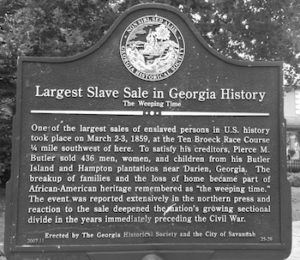
*On this date in 1859, "the weeping time" of chattel slavery occurred in America. This was the largest single sale of human beings in history in the United States.
This episode took place at a racetrack in Savannah, Georgia. During the two-day auction, rain fell continuously, almost as though the heavens were crying. So, tears fell from several of the 436 men, women, and children auctioned off. The Antebellum South sale would thereafter be known as "the weeping time." The white slave owner, Pierce Mease Butler, and his brother John had inherited the family's Georgia plantations some twenty years earlier.
But Pierce had squandered away his portion of the inheritance, losing a rumored $700,000, and was deeply in debt. Management of Pierce Butler's estate was transferred to trustees. The trustees sold Butler's Philadelphia mansion for $30,000 and other Butler properties. However, it was not enough to satisfy creditors or ensure that Butler would continue to live in luxury. So the Georgia plantations and their "moveable" property, their slaves, were next.
At the time, the Butler family holding included 900 slaves, divided into two groups 450. Half would go to the estate of John, who had since died and would remain on the plantations. The fate of the other 450 Pierce's half was more precarious, with about 20 continuing to live on the Butler property. The remainder were boarded onto railway cars and steamboats and brought to the Broeck racetrack, where each would be sold to the highest bidder.
There were differing viewpoints regarding the auction, Pierce Butler, and the considerable fortune he would gain after paying his debts. Philadelphia socialite Sidney George Fisher wrote, "It is highly honorable to [Butler] that he did all he could to prevent the sale, offering to make any personal sacrifice to avoid it."
Of the auction, Fisher wrote: It is a dreadful affair, however, selling these hereditary Negroes. Families will not be separated, that is to say, husbands and wives, parents and young children. But brothers and sisters of mature age, parents and children of mature age, all other relations and the ties of home and long association will be violently severed. It will be a hard thing for Butler to witness, and it is a monstrous thing to do. Yet it is done every day in the South. It is one among the many frightful consequences of slavery and contradicts our civilization, our Christianity, or Republicanism. Can such a system endure; is it consistent with humanity, with moral progress? These are difficult questions, and still more difficult is it to say, what can be done? The Negroes of the South must be slaves, or the South will be Africanized. Slavery is better for them and for us than such a result.
Mortimer Thomson, a popular newsman of the day, wrote a lengthy, uncomplimentary article about the auction for the New York Tribune entitled "What Became of the Slaves on a Georgia Plantation." He reported how the slaves, eager to impress potential masters who they perceived as kind, would sometimes cheerfully respond to buyers, "pulling their mouths open to see their teeth, pinching their limbs to find how muscular they were, walking them up and down to detect any signs of lameness, making them stoop and bend in different ways that they might be certain there was no concealed rupture or wound." Thomson also sympathized with the slaves after the sale, writing, "On the faces of all was an expression of heavy grief; some appeared to be resigned to the hard stroke of Fortune that had torn them from their homes, and were sadly trying to make the best of it; some sat brooding moodily over their sorrows, their chins resting on their hands, their eyes staring vacantly, and their bodies rocking to and fro, with a restless motion that was never stilled."
The two-day sale netted $303,850 in 1859. The highest price for one family, a mother and her five grown children, was $6,180. The highest price for one individual was $1,750. The lowest price for any slave was $250. Soon after the last slave was sold, the rain stopped. Champagne bottles popped in celebration. And Pierce Butler, once again wealthy, made a trip to southern Europe before returning home to Philadelphia.